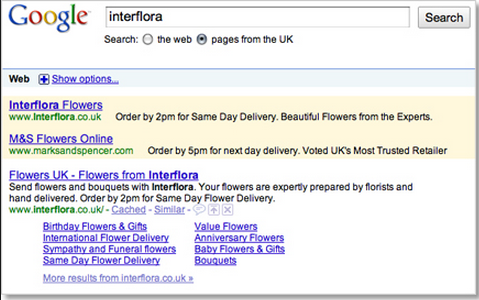Interflora won a landmark court case against Marks & Spencer last month for bidding on their brand term. As the dust settles on this five year legal battle questions are now being raised across the industry as to the long term ramifications of this victory.
In this case the courts (eventually) ruled that Marks & Spencer appearing for the search term interflora was confusing as to the origin of the advertised goods and service. So in basic terms it was the courts decision that M&S were making you, the searcher, believe that they were affiliated with Interflora.
So, should all PPC advertisers bidding on competitor terms immediately pause these keywords and send a bunch of apology flowers to the competitor in question?

Google’s policy
There is no breach in Google policy for bidding on competitor brand terms. This strategy is utilized throughout almost every market for which PPC advertising is used. If your competitors brand terms aren’t trademarked then technically you could use it in your ad copy.
However, as you cannot appear to be trying to pass yourself off as your competitor it is not advised. Also from a legal standpoint, approach this strategy with caution.
Interfloras victory was not due to Marks & Spencer breaching Google policy, it was a legal decision.
The use of competitor trademarked brand names in your ads without the express permission of that competitor is a breach of Google policy. It would also be wise to avoid any language which suggests an affiliation between you and a competitor that doesn’t exist.
It is far better to avoid trying to find loopholes in Google Policy. The open and honest image of your brand should be reflected in how you define your PPC strategy.
How to protect your own brand name
Quite understandably, you may wish to prevent other companies from using your brand name in their PPC advertisements or from bidding on your brand keywords at all. In this case you need to get in touch with Google and fill out their Trademark Complaint form. This will prevent competitors using your brand terms in their ad copy. However, this does not provide the same protection if you are not trademarked!
As you can imagine there are numerous complications that arise if your brand name is also a generic term. Take for example the keyword order flowers. In this case the searcher could be looking to simply order flowers from any company, or could be looking specifically for orderflowers.com.
Authorizing accounts to use your trademark
There is no need to panic if you have a number of resellers of your products or have an affiliation with other companies who utilize your products/brand name. You can authorize their accounts through Google to use your trademark in their ads.
What does the future hold?
We all want a fair and open platform for PPC advertising. We want customers to be able to find our ads when they might not otherwise, but we also want to protect the brand names that our ads are appearing for. Advertisers should expect the currently conflicting views of Google Policy and EU Policy to be resolved in the near future and this will result in firmer action being taken on questionable competitor bidding strategies.


